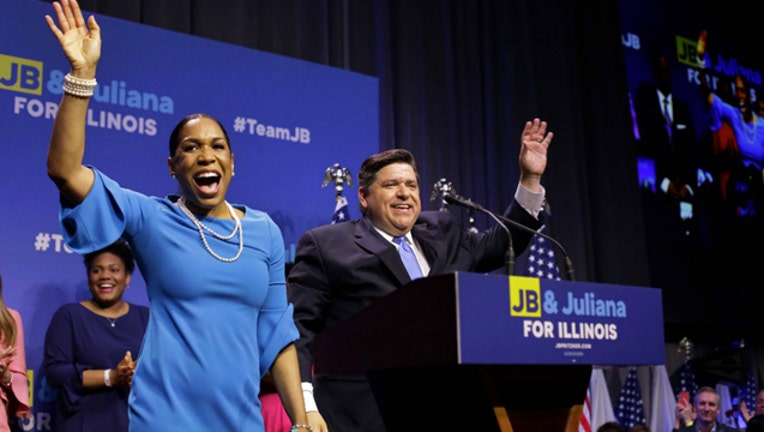Democrats giddy about odds of retaking Illinois' top job

(Photo by Joshua Lott/Getty Images)
CHICAGO (AP) - Democrats are giddy following Illinois' primary about their chances of reclaiming the governor's office from a GOP incumbent who barely survived his own nomination fight.
Billionaire J.B. Pritzker received almost 575,000 votes on Tuesday, consolidating support from Democratic voters who turned out in midterm numbers not seen in more than a decade to defeat his closest rival by 20 points. Pritzker's vote total was about 200,000 more than Republican Gov. Bruce Rauner received against a conservative state lawmaker who had huge disadvantages in fundraising and name recognition but still finished within 3 points of him.
Pritzker said the results are an indication of how motivated Democrats are across the U.S. since President Donald Trump was elected, and how unhappy people in Illinois are with Rauner's leadership.
"I've been involved in politics a long time and I've never seen Democrats as enthusiastic as they are right now," Pritzker said. "I think it means in the fall we stand a real good chance of beating Bruce Rauner."
Pritzker, an heir to the Hyatt hotel fortune who already has put about $70 million into his own campaign, launched new campaign ads Wednesday blasting Rauner's "four years of failure." He also held an event with Illinois residents who said they'd been hurt by the more than two-year state budget crisis that resulted from disagreements between the first-term governor and Democratic leaders.
Rauner, a wealthy former private equity investor, made clear he won't go down without a fight.
He launched his own ads Wednesday, using clips of Pritzker's primary opponents blasting him as the "poster child for pay-to-play politics" and linking him to unpopular but powerful longtime Democratic House Speaker Michael Madigan.
"We're the reformers. We're for the people of Illinois," Rauner said during a stop at a suburban Chicago business where he called Pritzker "a corrupt insider who's a tax dodger" and who "works for the corrupt machine that's controlled by Madigan."
Rauner, 61, was one of a handful of Republican governors elected to lead Democratic-leaning states as part of a GOP wave four years ago. He won his first political office with promises to "shake up" the state with an anti-union, pro-business agenda including term limits on lawmakers and lower property taxes.
He also said he had "no social agenda," helping him pick up support from independents and even some Democrats who hoped electing a businessman could solve some of Illinois' deep financial problems.
But his efforts to pass a more business-friendly agenda were stymied by the Democratic-controlled Legislature. Illinois also racked up billions in unpaid bills and other debts during the nation's longest state budget impasse, then was unable to stop lawmakers from passing an income tax increase as part of a deal to end the stalemate.
It was his approval of abortion and immigration legislation, though, that most angered the more conservative wing of his party and prompted state Rep. Jeanne Ives to launch a primary challenge.
She accused Rauner of betraying Republicans, and it appeared the two weren't putting the bad blood behind them even after Rauner's victory. In her concession speech Ives didn't pledge to support Rauner in the general election or call for other Republicans to do so. As of midday Wednesday they had not spoken.
That leaves Rauner with an even more difficult climb to a second term, said Northwestern University political science professor Jaime Dominguez.
"The Republican Party is disenchanted right now," he said. "They don't have anything to show for having a Republican governor. And (Rauner) barely squeezed through just with Ives, so that doesn't bode well."
Pritzker, however, has his own vulnerabilities. During the primary the Chicago Tribune published wiretap audio of Pritzker talking with former Gov. Rod Blagojevich, who's now imprisoned for corruption. Rauner used the audio, which was captured by the FBI, in a barrage of anti-Pritzker ads.
Pritzker also has had to answer questions about his connections with overseas trusts in low-tax countries, though he maintains they're focused on charitable giving and that he has no control over them.

